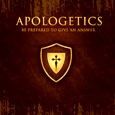
The Orthodox Church suffers from an abysmal lack of cogent apologetic material. Interestingly, thanks to blogging, I believe this will change soon. Someone like you or me will get so tired of not having the kind of printed material we need, that we’ll just make it ourselves, and in the day of print-on-demand publishers (see here for examples of my own books, published at Lulu.com), well – it won’t be long.
In the meantime, we stand at a wonderful threshold. Blogging makes it possible for us to address apologetic points one at a time, and at any pace, or any depth, we wish to.
Let me give you a simple example, one that I’m sure you have used yourself from time to time.
As clergy/preachers/evangelists, we regularly encounter the person who loves to make the clergyman/preacher/evangelist stupid. Often, they precede their ‘zinger’ with a question or two, but sometimes they just parrot things they have heard from someone else, without even bothering to think about it, let alone check on it.
One such example, especially as we head into the Nativity Fast is the Virgin Birth (leaving off the Ever-Virginity of Mary for the moment).
“Well, you know, the Hebrew word in Isaiah (7:14, but they usually don’t even know it’s from Isaiah), is not virgin, but young girl. And the Old Testament is written in Hebrew. So you see, it could be that Mary wasn’t a Virgin at all!”
It is at this point that, if my head doesn’t explode, I consider what I have just heard.
First of all, the word in the Septuagint Old Testament is parthenos, which in Greek only means virgin. The Septuagint is 1,000 to 1,300 years older than the Masoretic text, which is the Hebrew text most heterodox Bibles are translated from. The Masoretic text didn’t even exist during the time of Christ and the Apostles! The Septuagint translation was clearly from an older, more accurate version of the Old Testament written before anti-Christian sentiment appeared among Jewish Biblical translators (after all, Christians had been using the Septuagint Old Testament for 700-1,000 years to prove that Jesus was the Christ! I guess they got tired of that). After all, the translators of the Septuagint were all Jews, and they had no bone to pick about the Messiah.
Secondly, the word in Hebrew in the Masoretic is almah. It doesn’t just mean ‘young girl.’ It means ‘maiden,’ with all the baggage that comes from that age-old English word. A maiden is, by direct implication, a virgin. Only a maiden could, in popular European myth, capture a unicorn, due to her virginal purity.
Finally, the entire prophecy from Isaiah reads as follows;
“Therefore the Lord himself shall give you a sign; Behold, a virgin shall conceive, and bear a son, and shall call his name Immanuel.” Isaiah 7:14
Now, young women conceive and bear sons thousands of times a week. What kind of a sign would that be? None. That would be no sign at all. Such a prophecy or prophetic statement would be literally meaningless.
No, in fact, if you are reading the prophecy of Isaiah, you can’t come to any other conclusion that the prophecy refers to virgin conceiving a son. Period.
I’m in support of apologetic snippets in blogs, and I believe you will find that these will become your readers’ favorites.
Why?
Because you are adding to their own apologetic and evangelist arsenal. You’d be surprised how many Christians have to defend their faith every day, in various circumstances. Hey, it gets tiring! Give them some ammo. Give them some armor.
Give them some of what has helped and enlightened your own walk, your own study, and your own faith. It’s not complicated, but very pastoral.
Pick a topic with which you have had some experience. Begin your blog essay and write for as much or as little as you like.
But whatever you do, blog it.
